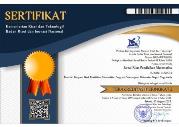Vol. 12 No. 2 (2025): November 2025
Vol. 12 No. 2 (November 2025) Edition of the Journal of Mathematics Education Research (JRPM) presents articles that reflect the dynamics, developments, and diversity of research focuses in the field of mathematics education in Indonesia. The topics published in this edition show a broad scope, ranging from innovations in learning models, deepening of didactic theories, analysis of student thinking strategies, to the integration of cutting-edge technologies such as Virtual Reality and Artificial Intelligence. Broadly speaking, the articles in this edition discuss, among others, the development of a Problem-Project Based Learning model that combines strengthening entrepreneurial character while improving students' mathematical reasoning abilities; a review of the transposition of algebraic knowledge by educators in an effort to bridge the structure of mathematical concepts with the structure of student learning; and an analysis of students' verbal thinking structures in solving geometry problems through procedural, disputational, and exploratory interaction approaches. In addition, this edition also presents research on computational thinking skills in exponential topics through Problem-Based Learning, a Systematic Literature Review on Self-Regulated Learning in mathematical problem-solving, an in-depth analysis of whether students are truly engaging in connective thinking or simply memorizing patterns, and a PISA 2022 data-based study on the relationship between teacher cognitive activation and Indonesian students' mathematics achievement. The concluding article explores the opportunities and challenges of implementing VR and AI in mathematics learning, emphasizing the urgency of digital transformation in the teaching and learning process.
This edition also features a strong diversity of authors. Contributors come from various public and private higher education institutions in Indonesia, with diverse expertise—ranging from mathematics pedagogy, educational technology, educational data analysis, to theoretical didactics studies. This diversity enriches the perspectives presented in each article and indicates that mathematics education research in Indonesia continues to develop collaboratively and multidisciplinary.
From a scientific perspective, this edition has a significant impact on the future direction of mathematics education research. Several emerging themes—such as the integration of immersive technology, strengthening student self-regulation, reconstructing cognitive strategies, activating teachers' cognitive abilities, and learning approaches that build character and 21st-century competencies—indicate a strong need for continued research that combines pedagogical innovation with empirical evidence. Furthermore, PISA findings highlight the need for longitudinal research, strengthening data-driven curricula, and improving learning quality through task design that encourages higher-order thinking. Meanwhile, VR/AI studies open up new research avenues highly relevant to the digital transformation of national education.








